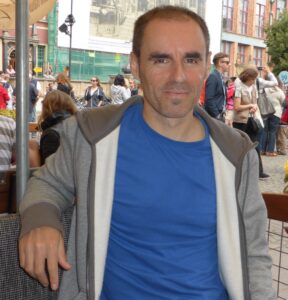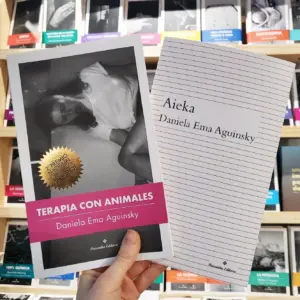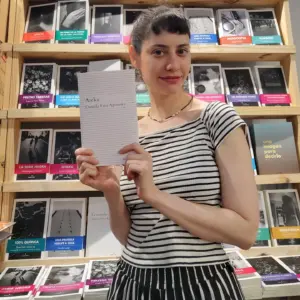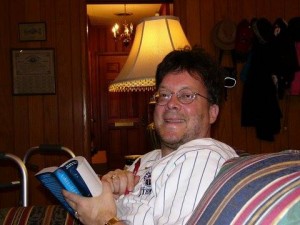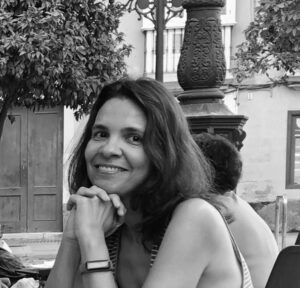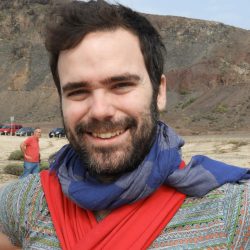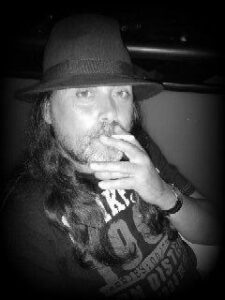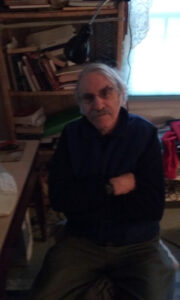(i.) don’t want not to go don’t want can’t not be no dancing to this blood divides sequences dreams cloud by cloud enclosed behind fingers last night crossed the pavement on the corner perplexed to see you again on the screen as if someone had been silhouetted against the sky or a bulldozer had piled up all the light of the slowness as it passed through (i.) no quiero no ir no quiero no puedo no estar no bailar en esta sangre divide secuencia el sueño nube a nube enrejado entre dedos anoche crucé la acera justo en la esquina perplejo al re-mirarte en la pantalla como si hubiera ido surgiendo alguien en lo alto o una excavadora hubiera apilado toda la luz de lo lento al pasar
(ii.) where you touch is not mine i just want you to be an other willing to explore something new perhaps what used to be constant may explode into shared fire the helipad where we used to get dressed i just want the fuel of breath breath breath to flare up (ii.) donde tocas no es mío pretendo que seas otro para algo nuevo que explorar quizá explosione en incendio común lo que solía ser constante la helisuperficie donde solíamos vestirnos solo pretendo que sea brote el combustible de respirar respirar respirar
(iii.) he kept on talking about movies amenabar juliette binoche cary grant alice in wonderland [alice’s adventures under ground] sit down tie my shoes he pretended to fly like an airplane with his arms outstretched north by northwest get on your knees why are you crying? did I tell you not to go? [I have all your pictures and emails. And don’t tell me you have no father, ‘cause I know he goes by Arturo and he’s a delivery man. I have all the information needed for the danse macabre to start. Will you please take off your t-shirt?] (iii.) hablaba de cine amenabar juliette binoche cary grant alicia en el país de las maravillas [las aventuras de alicia bajo tierra] siéntate átame los cordones imitaba el vuelo de un avión con los brazos extendidos con la muerte en los talones ponte de rodillas ¿por qué lloras? ¿te he dicho yo que no puedes irte? [Tengo todas tus fotos y tus correos. Y no me digas que no tienes padre porque sé que se llama Arturo y que es repartidor de café. Tengo toda la información necesaria para que empiece la danse macabre. ¿Puedes subirte la camiseta?]
(iv.)
to the seasoned traveller
a destination is
at best
a rumour
the real issue is
structure
how to locate the narrative line that allows for a beamline beneath the door
we’re talking about infinite degrees of freedom here
you can rotate it
but
it’ll remain in the same place
do we know the rules? who’s up or down? who’s at the steering wheel?
we can look for (all the) tracks in the carpet
the traces they left we left a return covenant quizá
but
blah blah blah blah blah blah
line = broken line
we retrace our steps and nothing is familiar nothing
which crossbars will be forded by our caesura?
(iv.)
para el viajero con experiencia
un destino es
en el mejor de los casos
un mero rumor
en el fondo
se trata de la estructura
de localizar la línea narrativa que deje la línea de luz bajo la puerta
hablamos con un grado de libertad infinito aquí
puedes rotarlo una mil veces
pero
sigue en el mismo sitio mismo
¿sabemos las reglas? ¿quién sube/baja? ¿quién sigue al volante?
podemos buscar (todas) las huellas en la alfombra
huellas que dejen dejemos un pacto de vuelta maybe
pero
bla bla bla bla bla bla
línea = línea rota
re-trazamos los pasos y nada familiar nada
¿qué travesaños vadeará nuestra cesura?
(v.) helicopter. beach. he was walking alone. sometimes we need just one reason to quit. an aim over which the skin can be spread. it was just a breeze. smell of newly purchased salt. as if uncovering waves. why create such a stir. walking. crime against public health. remote database access. they landed. they escorted him. from both sides. just in case. in view of the risk. in the line of duty. (v.) helicóptero. playa. caminaba solo. a veces basta con una razón para huir. un objetivo en el que extender la piel. solo era brisa. olor a sal recién comprada. como destapar olas. por qué tanto revuelo. caminar. delito contra la salud pública. acceso remoto a todos sus datos. aterrizaron. le acompañaron. a ambos lados. por si acaso. por si el peligro. en cumplimiento del deber.
(vi.) transfigured face head and floor separated by a trickle of blood the gaze walled by an animal silence do you believe in life or death? in life, definitely both the fall and the body embalmed by the blasting until the parquet floor pattern is reached what is it that remains after the last anchoring? face down he expects something to move the start of a sob, or a void, or a question or a delay as abrupt as an ending (vi.) se desvive la cara un hilo de sangre separa cabeza y suelo un silencio animal cubre de pared la mirada ¿crees en la vida o en la muerte? en la vida, por supuesto la detonación embalsama caída y cuerpo hasta el patrón del parqué ¿qué permanece en el último anclaje? bocabajo espera algún movimiento un principio de llanto o de vacío o de pregunta o una espera tan simple como un final
Editor’s Note: The latter two poems were performed at the online venue Transforming with Poetry
8/1/21. by the author. See Facebook page.
Ángel Huerga (León, 1971) has collaborated in literary magazines such as Nayagua (Fundación Centro de Poesía José Hierro, nº 33), Solaria, Siete de Siete.net, and Las hojas del foro, as well as in the book of essays Poetas asturianos para el siglo XXI (Ed. Trea, 2009). Currently, he attends the Camaleones en la Azotea poetry workshop in Madrid, Spain, where he is based, and has contributed to the release of the a4rismos cardboard book edition (Fundación Sindical Ateneo 1º de Mayo y Taller de Poesía Camaleones en la Azotea, 2022).
He is a lyricist for Asturian-based band Fantástico Mundo de Mierda (FMM) (https://fantasticomundodemierda.bandcamp.com/), which has released the following albums: New Software (Lloria Discos, 2005), La Furia del Fin (Algamar Producciones, 2013), and La Fortaleza (self-released, 2018).
Additionally, he has contributed to translating into English some sections of the following works: El genio austrohúngaro. Historia social e intelectual (1848-1938), by William M. Johnston (KRK Ediciones, 2009), and “In bello fortis”: la vida del teniente general irlandés Sir William Parker Carrol (1776-1842), by A. Laspra and B. O’Connell (Fundación Gustavo Bueno, 2009).

